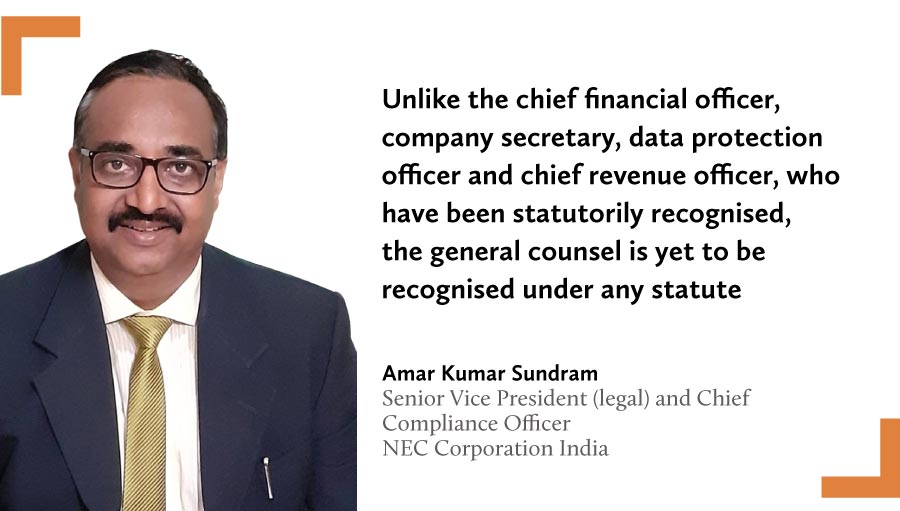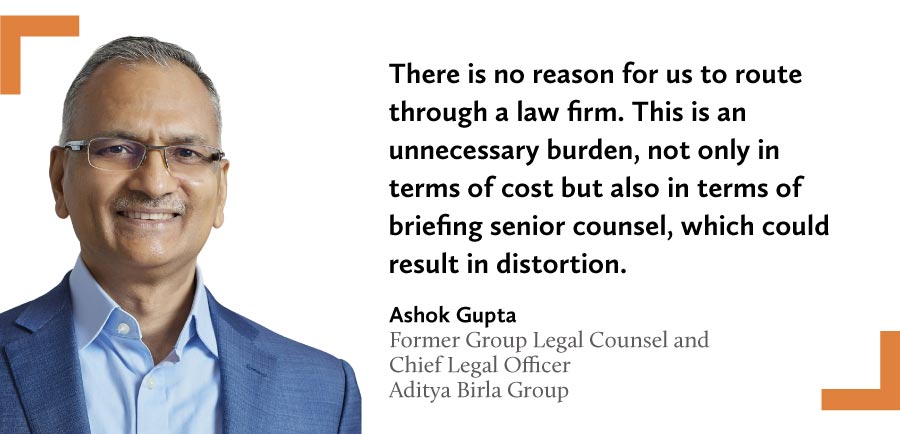In 2022, it seems bizarre that in-house counsel may not carry a bar licence owing to an antiquated law that dates to the middle of last century. Freny Patel looks at the battle for equity
Once an advocate always an advocate does not necessarily hold, at least not in India where a six-decade-old act defines a lawyer, and rules formulated by the Bar Council of India force a lawyer to surrender his bar licence once he moves in-house.
The Advocates Act of 1961 was aimed at uniting and creating a single class of attorneys called “advocates” at a time when there were six grades of legal practice in India. The act entitled only advocates to represent clients before courts, tribunals and statutory bodies in their distinguishable black robes.
General counsel or in-house counsel do not feature under the act. Professionals rendering legal services to corporations as employees are not recognised as lawyers or advocates under Indian law.
The general counsel is the most important professional at any corporation to uphold its values and so is instrumental in maintaining corporate governance, says Amar Kumar Sundram, co-founder of the General Counsels’ Association of India (GCAI).
“Unlike the chief financial officer, company secretary, data protection officer and chief revenue officer, who have been statutorily recognised, the general counsel is yet to be recognised under any statute,” says Sundram, who is also senior vice president (legal) and chief compliance officer at NEC Corporation India.

With a lot at stake, and not merely a question of wearing black robes to argue before courts or statutory bodies, various bodies and associations of general counsel are pleading with the government and the Bar Council of India in their fight for due statutory recognition with equal rights and privileges as enjoyed by practising lawyers.
The rules of the Bar Council, more specifically, rule 49, state that an advocate cannot be a full-time employee of any person, government, firm, corporation or concern.
In-house counsel have been providing legal services to employers ever since legal practice started, yet no legislation or rules define them, legal experts tell India Business Law Journal.
The Advocates Act identifies that advocates can regularly appear in the courts and undertake litigation work. Back in 1961, transactional work was practically non-existent, says Ashok Sharma, founder and CEO of the Federation of Indian Corporate Lawyers (FICL).
Today, the bulk of the transactional work is initially handled by in-house counsel, including drafting contracts and agreements, M&A negotiations and due diligence, and ensuring regulatory compliance.
Since in-house counsel cannot appear before the court as advocates, corporations employing them have to engage external counsel to act as an advocate before the courts. Protocol demands that senior counsel engage with clients through a law firm or an external lawyer.
“There is no reason for us to route through a law firm,” says Ashok Gupta, former group legal counsel and chief legal officer at Aditya Birla Group. “This is an unnecessary burden, not only in terms of cost but also in terms of briefing senior counsel, which could result in distortion.”
Greater emphasis should be given to the role of the general counsel in terms of adding value and giving strategic advice, Parvesh Kheterpal, founder of the Alliance for Corporate Counsel and Company Secretaries India (ACoS) has said previously.
The in-house counsel profession should be regulated and receive statutory recognition, said Kheterpal at an ACoS annual meeting and international summit in July 2022. “This will strengthen not only the legal profession as a whole, but also the businesses that general counsel advise,” said Kheterpal, who is also the head of legal and company secretary at the Feedback Infra Group.
Gupta says there should be no difference between external lawyers and in-house counsel because, ultimately, all cases are routed to external counsel through general counsel.

Another bone of contention general counsel face relates to future employment opportunities.
Giving up their bar licence at the time of going in-house affects the future employability of a general counsel. This is because many posts in government or regulatory bodies prescribe that eligible candidates should have several years of experience as an advocate. Once a general counsel gives up his licence, despite having relevant corporate experience, he is ineligible for these posts, says Sharma.
Post-retirement, many general counsel may wish to join statutory regulatory bodies given their relevant experience in compliance and corporate work, says Sharma. “Despite their having a ring-side perspective of corporate issues, they cannot apply for the posts because they do not have the relevant experience as an advocate,” he says.
Given their wealth of experience, corporate governance and ethical practices, in-house counsel are highly sought as independent directors, says Shukla Wassan, former general counsel at Hindustan Coca-Cola Beverages and co-founder of the GCAI.
ATTORNEY-CLIENT PRIVILEGE
Then there is the issue of confidentiality. The attorney-client privilege is only given to external lawyers, says Gupta. This means discussions held between the in-house counsel and the management are not protected by this privilege.
“There is no reason why it should not be available to them when general counsel do much more than external counsel and often tend to nip issues in the bud as they attend to day-to-day business and take care of the legalities,” says Gupta.
This anomaly stems from the Advocates Act and the Evidence Act of 1872. Confidential information given to an in-house counsel cannot be protected under the ambit of sections 126 or 129 of the Evidence Act, because it is only applicable to “advocates”, says Nitin Jain, a Mumbai-based partner at Agama Law Associates.
Former Supreme Court judge B N Srikrishna had opined in June 2012, in the Shire Development v Cadila Healthcare case that: “An employee in-house counsel rendering advice even on matters of law, however valuable, does not qualify to be a ‘legal professional adviser’ within the meaning of section 129 of the Indian Evidence Act, 1872. There would thus be no privilege attached to his advice or communications with him, as neither section 126 nor 129 would apply to such advice or communication.”
ACT VERSUS RULE
The general counsel’s fight for statutory recognition under Indian law ultimately rests with the Bar Council of India, says Lalit Bhasin, president of the Society of Indian Law Firms and past president of the Bar Association of India.
“It is up to the Bar Council of India because there cannot be a separate demand for different treatment for general counsel,” says Bhasin. “They have to work within the framework of the Advocates Act.”
An amendment to the Advocates Act isn’t required, adds Bhasin. “There is no need for a separate law or a separate code, but a simple amendment to the rules, which is within the jurisdiction of the Bar Council,” he says.
The Bar Council would have to modify its regulation that states that a lawyer cannot be employed, says Bhasin. It has to be clarified that a lawyer who is working as a general counsel or in-house with a corporate body will be permitted and his licence need not be suspended.
But Sharma feels otherwise, saying that an amendment to the old Advocates Act is warranted because it defines an advocate. “Unless the Advocates’ Act 1961 is amended, this problem will remain,” he says, because the Advocates Act only talks of advocates appearing before courts and doing litigation work.
The Bar Council of India is a regulatory body created under the Advocates Act, and any proposed amendments cannot go beyond the provisions of the act, says Sharma.
You must be a
subscribersubscribersubscribersubscriber
to read this content, please
subscribesubscribesubscribesubscribe
today.
For group subscribers, please click here to access.
Interested in group subscription? Please contact us.



























